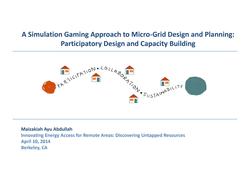Difference between revisions of "A Simulation Gaming Approach to Micro-Grid Design and Planning: Participatory Design and Capacity Building"
From energypedia
***** (***** | *****) (Created page with "[[File:MES Berkley small.png|center|800px|Innovating Energy Access for Remote Areas: Discovering Untapped Resources|alt=Innovating Energy Access for Remote Areas: Discovering ...") |
***** (***** | *****) |
||
| Line 1: | Line 1: | ||
| + | |||
[[File:MES Berkley small.png|center|800px|Innovating Energy Access for Remote Areas: Discovering Untapped Resources|alt=Innovating Energy Access for Remote Areas: Discovering Untapped Resources|link=Innovating Energy Access for Remote Areas: Discovering Untapped Resources]] | [[File:MES Berkley small.png|center|800px|Innovating Energy Access for Remote Areas: Discovering Untapped Resources|alt=Innovating Energy Access for Remote Areas: Discovering Untapped Resources|link=Innovating Energy Access for Remote Areas: Discovering Untapped Resources]] | ||
| Line 11: | Line 12: | ||
<br/> | <br/> | ||
| − | = <span dir="auto"> | + | = <span dir="auto">A Simulation Gaming Approach to Micro-Grid Design and Planning: Participatory Design and Capacity Building</span> = |
| − | Presenters: ''' | + | Presenters: '''Maizakiah Ayu Abdullah''' |
<br/> | <br/> | ||
| Line 21: | Line 22: | ||
{| border="0" cellspacing="3" cellpadding="5" style="width: 800px;" | {| border="0" cellspacing="3" cellpadding="5" style="width: 800px;" | ||
|- | |- | ||
| − | | ... | + | | Existing micro-grid design and planning approaches tend to emphasize techno-economic assessments and lack community engagement, necessary for effective planning and implementation. New approaches must be employed to not only include significant social impacts of micro-grids beyond technical components, but prioritize human development objectives, participation and capacity building. A simulation gaming approach to micro-grid design provides an innovative, participatory tool and process that incorporates social, organizational, technical and financial factors for improved design and planning. Additionally, the approach represents an experiential learning and capacity building exercise that teaches shared resource management and collaborative decision-making<ref>A Simulation Gaming Approach to Micro-Grid Design and Planning: Participatory Design and Capacity Building. Maizakiah Ayu Abdullah and Scott Kennedy.</ref>. |
| − | | [[File: | + | | [[File:A Simulation Gaming Approach to Micro Grid Design and Planning - Participatory Design and Capacity Building.pdf|border|right|250px|File:A Simulation Gaming Approach to Micro Grid Design and Planning - Participatory Design and Capacity Building.pdf|alt=File:Experience from First Solar Mini Grid Service in Bangladesh.pdf]] |
|} | |} | ||
| Line 33: | Line 34: | ||
__NOEDITSECTION__ | __NOEDITSECTION__ | ||
| + | [[Category:Energy_Design]] | ||
| + | [[Category:Micro-grid]] | ||
| + | [[Category:Capacity_Development]] | ||
[[Category:Conference_Documentation]] | [[Category:Conference_Documentation]] | ||
| − | |||
| − | |||
| − | |||
Revision as of 15:15, 23 April 2014
A Simulation Gaming Approach to Micro-Grid Design and Planning: Participatory Design and Capacity Building
Presenters: Maizakiah Ayu Abdullah
Overview
| Existing micro-grid design and planning approaches tend to emphasize techno-economic assessments and lack community engagement, necessary for effective planning and implementation. New approaches must be employed to not only include significant social impacts of micro-grids beyond technical components, but prioritize human development objectives, participation and capacity building. A simulation gaming approach to micro-grid design provides an innovative, participatory tool and process that incorporates social, organizational, technical and financial factors for improved design and planning. Additionally, the approach represents an experiential learning and capacity building exercise that teaches shared resource management and collaborative decision-making[1]. |
References
- ↑ A Simulation Gaming Approach to Micro-Grid Design and Planning: Participatory Design and Capacity Building. Maizakiah Ayu Abdullah and Scott Kennedy.





















